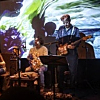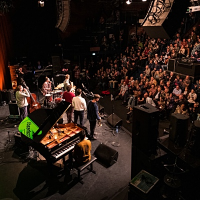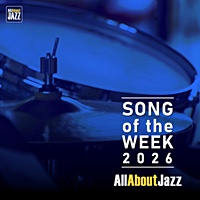Home » Jazz Articles » Don Friedman
Jazz Articles about Don Friedman
Heiner Stadler: Brains on Fire

by Howard Mandel
Brains on Fire fuels reflection on the past and response in the present. These eight extraordinary extended tracks, recorded in unusual conjunctions of master jazz improvisers instigated by composer/pianist Heiner Stadler for sessions held from 1966 through 1974, are alive with the passions of that era celebrating large, original works stretching the bounds of even the most ambitious music come before. As Stadler and his cadre of fully collaborative, creative interpreters brought immense smarts, skills and sensibilities besides ...
Continue ReadingClark Terry: This Could Be The Start Of Something Big! - Clark Terry Plays TV Themes

by Ken Dryden
The late NEA Jazz Master Clark Terry was known for his brilliant playing and sense of humor, the latter which first came into wide recognition when he introduced his “Mumbles" routine in two original blues on the album Oscar Peterson Trio + 1—Clark Terry (Mercury, 1964). By the early 1970s, he was well established and had briefly led a big band as well, though his primary focus remained on small groups. This previously unissued session of television themes was suggested ...
Continue ReadingHeiner Stadler: Brains on Fire

by AAJ Italy Staff
Heiner Stadler è nome pressoché sconosciuto se non agli addetti ai lavori o a qualche curioso appassionato jazzofilo. Nasce nel 1942 a Lessen in Polonia, cresce ad Amburgo dove studia pianoforte, armonia e composizione al conservatorio, per poi trasferirsi nel 1965 a New York. Qui intesse una serie di relazioni con importanti musicisti dal background assai variegato (si va sa Benny Golson a Barre Phillips, da Joe Chambers a John Gilmore e Joe Farrell, da Dee Dee Bridgewater a Thad ...
Continue ReadingHeiner Stadler: Brains on Fire

by Hrayr Attarian
Heiner StadlerBrains on FireLabor Records2012One of the most exciting reissues of the first quarter of 2012 is composer and pianist Heiner Stadler's pioneering Brains on Fire, originally released in 1973. The two-CD reissue adds three lengthy, previously unreleased tracks and informative and well-researched liner notes by critic Howard Mandel. Interestingly, Stadler occupies the piano chair only on five of the eight pieces, recorded over a seven-year span in a ...
Continue ReadingDon Friedman: Waltz For Marilyn

by A. Henkin
Don Friedman Waltz For Marilyn Jazz Excursion Records 2007
In jazz, for all of its love of the all-star session, the long-term collaboration is of utmost importance. There have been many such relationships: bassist Charles Mingus and reed player Eric Dolphy, saxophonist John Coltrane and drummer Elvin Jones, trumpeter Miles Davis and saxophonist Wayne Shorter. When players reach a level of understanding, notions of leaders and sidemen or soloists and accompanists become ...
Continue ReadingDon Friedman: Waltz for Marilyn

by Samuel Chell
The impressive vita and discography of Don Friedman are but touchstones to the musicianship of this pianist who, like Kenny Barron and Hank Jones, navigates the jazz mainstream while remaining perpetually fresh if not cutting edge. On Waltz for Marilyn the seasoned veteran is joined by three like-minded, proven young musicians who bring the leader's conceptions to realization while making strong statements of their own. It's as though the pianist's flowing inventiveness has been magnified by four.
The program is ...
Continue ReadingIn the Belly of the Beast: The Story of a Recording Session

by Victor L. Schermer
It is no coincidence that jazz emerged around the same time that Edison invented the phonograph. Both jazz and recording by electrical impulses were among the early signs of “modernity. Furthermore, jazz is an improvisational form of music that is composed as it is performed, and, unlike classical music with its well-tempered scale and relatively uniform standards, jazz is almost impossible to notate in more than its barest outlines. The only viable way to preserve it is on recordings. Recordings ...
Continue Reading

















